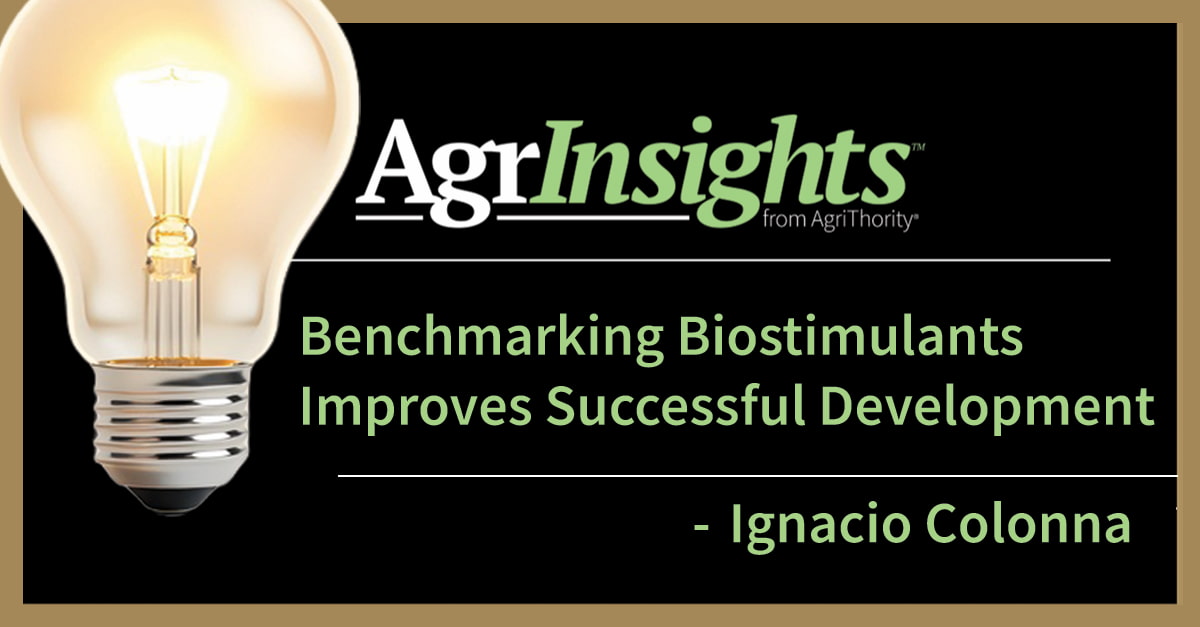Capturing insights and learning is a continuous process. Every season offers experiences unlike others, but in 2022 the AgriThority® product development trial results provided revealing insights that led to actionable recommendations from the AgriThority® team.
Here is a concise summary of some noteworthy results.

- Biofungicides: Two bio-fungicides, one plant-based and the other microbial integrated into the conventional synthetic fungicide spray programs provided statistically comparable control of the several fungal diseases of many specialty crops with reduced fungicide residue and increased yield. Integration of the biofungicides into conventional synthetic fungicide spray programs will also reduce the probability of development of resistance, increase the life of synthetic chemistries and reduce the fungicide residue.
- Microbial seed treatment: A broad spectrum microbial fungicide applied as seed treatment provided statistically comparable control of the soybean Sudden Death Syndrome disease to the commercial bio and synthetic fungicides. Plant growth and nodulation were also significantly enhanced.
- Microbial inoculants: Two microbial seed inoculants applied alone and together as seed treatment improved the growth, nodulation and yield of soybean plants comparable to the seed inoculants currently used by the growers. A new formulation of a microbial inoculant, which is easy to handle, store and mix when applied in furrows at planting, improved growth, nodulation and yield of peanut plants comparable to the inoculants currently used by growers.
- Biostimulants: Three microbial products together with rock phosphate improved the availability and uptake of phosphorus and the other nutrients with increased sweet corn fresh ears yield over the rock phosphate alone and was comparable to the Grower Standard Practice (GSP) both in organic and conventional farming.
- Mycorrhizae based products: A mycorrhizae biostimulant applied with starter solution 10-34-0 improved the growth and productivity of corn plants over the GSP. Another biostimulant consisting of silicon, Humic acid and mycorrhizae applied as pre-plant broadcast and in-furrow at planting with the standard MAP improved the performance of MAP with enhanced growth and yield in corn and soybeans.
- Silicon applied as coated DAP (Diammonium Phosphate), or Ortho Silicic Acid granules improved the uptake of phosphorus and overall growth and productivity of corn plants compared to the standard DAP with a 25% reduction of P2O5 ac-1 requirement compared to the GSP while providing similar corn grain yield.
- Two fertilizer programs with P2O5 from MAP coated with a microbial consortium that stimulates microbial activity in the soil and increases micronutrient uptake and from MAP coated with polymers to provide 10 to 50% slow release of available phosphate provided a higher corn grain and soybean yield compared to the GSP standard MAP. Another fertilizer program with P2O5 from a product with efficient phosphorus delivery systems (chemically binding nutrients and with controlled release) resulted in a 25 to 50% reduction of phosphorus requirement compared to the GSP while retaining yield in corn and soybean by maximizing nutrient uptake and storing the excess nutrients as a natural buffer and releasing them only when needed.
- Winter and spring entries of camelina in the Midwest and Southeast USA proved successful, and it can be an alternative to wheat and other winter crops, particularly in the areas that have limited irrigation or less rain.
Together with our clients, we discover possibilities, expand potential, and define the pathway for technologies that often start only as concepts or in early development stages. We apply our experience and insights from every season to help clients avoid mistakes that cost time, money, or credibility in the market.
When your Research is ready for Development, turn to AgriThority® for scientific business, market, and product expertise to learn key insights on your new innovations. Our international footprint, combined with our deep understanding of market and producer dynamics, helps you to leap hurdles and overcome barriers to prepare your products for success.
 About Krishan: Krishan Jindal, Ph.D. senior field research scientist, oversees various programs for AgriThority® in Africa, Asia, and North America. He also provides technical support to product development teams from his more than 35 years of academic and industry experience – 10 years, of which, at AgriThority. His broad range of expertise covers crop production, crop protection, plant breeding, nutrient management, and technology transfer. Jindal is an assertive techno-commercial professional who designs, develops and executes laser-focus research programs to deliver results.
About Krishan: Krishan Jindal, Ph.D. senior field research scientist, oversees various programs for AgriThority® in Africa, Asia, and North America. He also provides technical support to product development teams from his more than 35 years of academic and industry experience – 10 years, of which, at AgriThority. His broad range of expertise covers crop production, crop protection, plant breeding, nutrient management, and technology transfer. Jindal is an assertive techno-commercial professional who designs, develops and executes laser-focus research programs to deliver results.
His professional experience includes positions with Savannah Seeds Pvt. Ltd, Australian Wheat Board India Pvt. Ltd, Hindustan Unilever Ltd, Punjab Agricultural University, Ludhiana, and University of Horticulture and Forestry, Solan, India.
More recently, Jindal worked for the University of Guelph at the Ottawa Research and Development Centre, Agri and Agri-Food Canada, Ottawa. As a member of the corn breeding team, he managed germplasm collection and evaluation, breeding, as well as interpretation of field results. This work included data analysis and publishing of 25 research papers in journals of international repute. Jindal is highly motivated with proven communication, analytical, and negotiation skills. His passion in field research is to develop innovative technologies for sustainable agriculture.
 About Madhu: Dr. Madhu Jindal brings more than 30 years of experience to her role as Research Manager/Analyst, NORAM at AgriThority®. Her expertise ranges from row crops (corn, wheat, and barley) and pulses (chickpea and dry beans) to plantation crops (sugarcane) and specialty crops (vegetable and ornamental plants).
About Madhu: Dr. Madhu Jindal brings more than 30 years of experience to her role as Research Manager/Analyst, NORAM at AgriThority®. Her expertise ranges from row crops (corn, wheat, and barley) and pulses (chickpea and dry beans) to plantation crops (sugarcane) and specialty crops (vegetable and ornamental plants).
Prior to joining AgriThority, Dr. Jindal was an integral part of many international research projects focused on the development of disease resistant varieties through novel genetic and molecular technologies. Additionally, Jindal independently managed many research projects to determine the etiology and epidemiology of economically important diseases and conducted studies in the areas of fungicides and germplasm for the management of diseases.
An expert researcher, Dr. Jindal has published 62 research papers and 19 research reports in scientific journals of national and international repute. Dr. Jindal received her master’s degree and Ph.D. in Plant Pathology from Punjab Agricultural University, Ludhiana, India.



